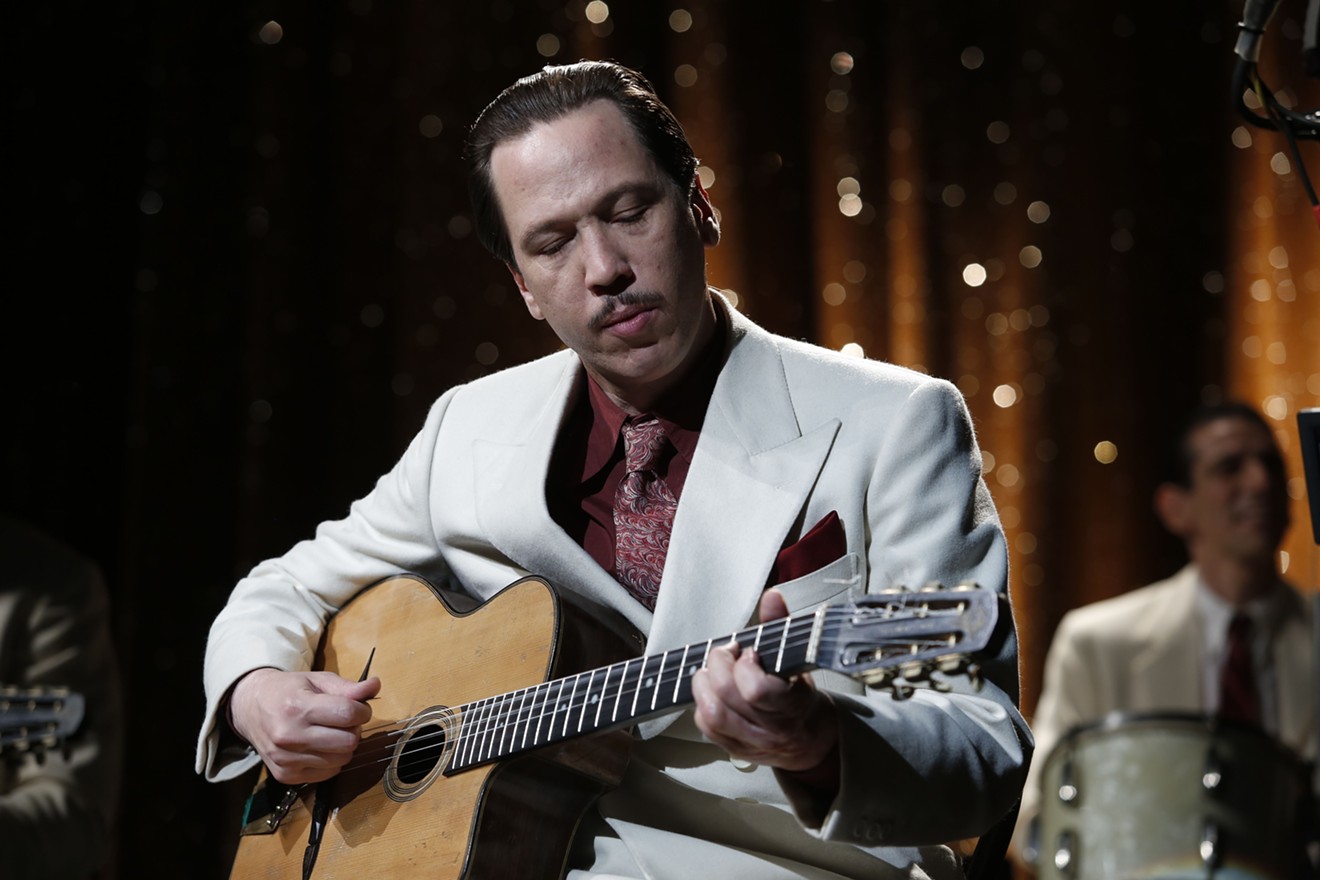Late in Django, a proudly fictionalized improvisation upon the theme of Django Reinhardtness, the world’s most famous gypsy-jazz guitar virtuoso gets told by a Nazi what he and his combo can and can’t play at the 1943 concert they’ve been coerced into performing for France’s occupiers. No blues, of course — none of what the Nazis call “monkey music.” Reinhardt (played with electric diffidence by Reda Kateb) is to avoid allegros and prestos, eschew extended solos. The players must not tap their feet and should allow into their set no more than “5 percent syncopation.” What 5 percent syncopation means, precisely, is in the ear — or the tempted-to-tap extremities — of the beholder.
As a film viewer, of course, you understand what actually matters: Our hero is being given the chance, via the swinging power of his art, to triumph over fascism. Later, at the gig, a swank SS cocktail party, an officer will hiss “No blues!” at Reinhardt when one number slinks along a touch too lustily. Kateb’s Reinhardt shakes him off, face flashing a confident confusion: He, the expert, knows that this song — absolutely a blues — isn’t a blues at all, and he can’t comprehend why anyone would think otherwise. The officer demurs, the music — already warm — grows hotter, and soon the swells of the Reich are carrying on like the vacationing Jews in the Catskills basements of Dirty Dancing.
Like Reinhardt playing that party in Thonon-les-Bains, on the border between France and Switzerland, Django director Etienne Comar refuses the limitations imposed on him. His film, a sort-of biopic, spares us the shopworn scenes familiar to the genre: Don’t expect to see young Django go through the paces of hitting his first lick, enjoying his first hit, disappointing his first lover or any of that. Comar zeroes in instead on Reinhardt and the Reich, with the guitar player, already famous, trying to get himself out of Nazi-controlled France. Comar establishes the stakes immediately, with a striking, almost fabulistic sequence of Roma musicians playing beguiling melodies in the woods — and being hunted down. (The end titles state starkly what those first moments made dreamlike: that the Nazis systematically killed 600,000 gypsies.) Comar’s narrative finds Reinhardt himself continually butting up against the Reich — and discovering that maybe he can set his fame and talents to saving some of his people.
So, Django becomes a not-bad caper-thriller, a cloak-and-dagger-and-guitar adventure with individual scenes, some of them excitingly suspenseful, that have little to do with actual incidents. But they have everything to do with the way Reinhardt’s joyously polyglot music challenged the “artistic purity” of fascism and actually inspired the Resistance — his fleet, fluid runs kill fascism dead. Django expresses, via the language of film genre, not what Reinhardt’s life was but what it might have felt like.
In that, he has a strong partner in Kateb, who spent a year learning guitar enough to appear to be actually playing in the excellent, extended concert sequences that the film highlights. Kateb’s fingers fly, but his face, often seen in the same shot, remains alluringly aloof, his Django performing a protective indifference. Kateb wears a poker face, his Django not letting on what he’s noticed or what he cares about. That’s the key to the coolness that Reinhardt embodied and to the spycraft that Django credits him with. Even when an ally credits our hero for standing up against the Nazis, Kateb’s Django shrugs off any appearance of heroism: “They killed my monkey,” he says, as if that explains artistry and courage.
One problem with familiar genre elements, though, is that they limit the chances for surprise. This Reinhardt behaves according to the logic of wartime espionage thrillers rather than messy spurts of an artist’s heart. Kateb handsomely suggests Reinhardt’s performance of a self — but he never has the chance to show us what’s beneath it.
[
{
"name": "Air - MediumRectangle - Inline Content - Mobile Display Size",
"component": "19274298",
"insertPoint": "2",
"requiredCountToDisplay": "2"
},{
"name": "Editor Picks",
"component": "17482312",
"insertPoint": "4",
"requiredCountToDisplay": "1"
},{
"name": "Inline Links",
"component": "18711090",
"insertPoint": "8th",
"startingPoint": 8,
"requiredCountToDisplay": "7",
"maxInsertions": 25
},{
"name": "Air - MediumRectangle - Combo - Inline Content",
"component": "17482310",
"insertPoint": "8th",
"startingPoint": 8,
"requiredCountToDisplay": "7",
"maxInsertions": 25
},{
"name": "Inline Links",
"component": "18711090",
"insertPoint": "8th",
"startingPoint": 12,
"requiredCountToDisplay": "11",
"maxInsertions": 25
},{
"name": "Air - Leaderboard Tower - Combo - Inline Content",
"component": "17482313",
"insertPoint": "8th",
"startingPoint": 12,
"requiredCountToDisplay": "11",
"maxInsertions": 25
}
]












